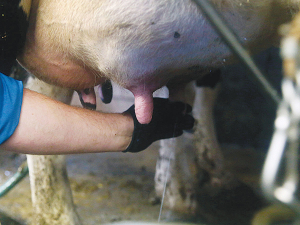Understanding udder health
Last month we talked about why dry cow management is critical, though often overlooked. This month I wanted to dive further into the dry period’s importance to udder health.
 Once bacteria enter the udder, the cow's immune system fights infection by producing white blood cells, measured as somatic cell count (SCC).
Once bacteria enter the udder, the cow's immune system fights infection by producing white blood cells, measured as somatic cell count (SCC).
Mastitis is the result of complex interaction between bacteria, the farmer, the milking machine and the cow.
Once bacteria enter the udder, the cow's immun system fights infection by producing white blood cells, measured as somatic cell count (SCC).
Depending on the degree of inflammation you may see changes in the milk (clinical mastitis), or no changes in the milk (subclinical mastitis).
Clinical mastitis means cows show symptoms, there is change in milk e.g. clots, watery, blood, heat and/or swelling in udder, reduced milk yield and the cow is off-colour.
Acute chronic infection appears suddenly and is usually relatively short-term infection; there are no symptoms in cow, but high somatic cell count (SCC), or reaction to rapid mastitis test (RMT), and often reduced milk yield.
How does mastitis spread? Mud and muck gets onto teats and causes mastitis, often in spring and is generally caused by streptococcus bacteria.
There can also be cow-to-cow spread; bacteria in the milk of an infected cow will contaminate the cups for the next five cows milked with that cluster. This is commonly caused by staphylococcus bacteria.
There are several ways you can treatment:
1. Clean the teat end, before taking a milk sample or treating the cow.
2. Collect initial milk sample, then either submit to lab for culturing bacteria, or freeze for later.
3. Treat with antibiotics as per veterinary authorisation.
4. Anti-inflammatory treatment will provide pain relief, reduce fever and swelling.
5. If the cow is very unwell, seek veterinary advice.
Four Main Bugs
So what are the bugs that cause mastitis in dairy cows? While there are a huge range of bugs that can cause mastitis, there are four main groups of bacteria responsible for the majority of cases:
Last month's Agritechnica event led to a wide group of manufacturers celebrating successes when the 2026 Tractor of the Year Competition winners, selected by a panel of European journalists, were announced in Hanover Germany.
According to the latest Federated Farmers banking survey, farmers are more satisfied with their bank and less under pressure, however, the sector is well short of confidence levels seen last decade.
Farmer confidence has taken a slight dip according to the final Rabobank rural confidence survey for the year.
Former Agriculture Minister and Otaki farmer Nathan Guy has been appointed New Zealand’s Special Agricultural Trade Envoy (SATE).
Alliance Group has commissioned a new heat pump system at its Mataura processing plant in Southland.
Fonterra has slashed another 50c off its milk price forecast as global milk flows shows no sign of easing.